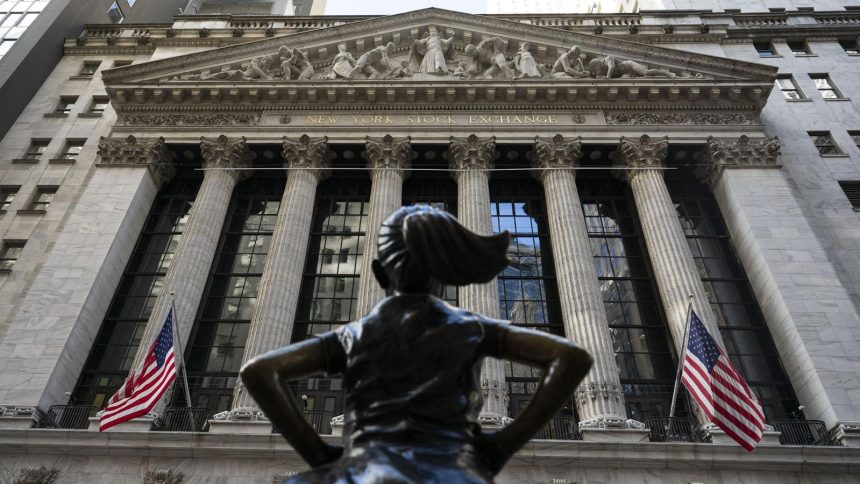The final trading day of a tumultuous week saw U.S. stock markets relinquish earlier gains, closing in negative territory as the White House confirmed President Trump’s intention to impose tariffs on imported goods from Canada, Mexico, and China. This announcement overshadowed initially positive market sentiment driven by encouraging inflation data and Apple’s strong earnings report. The Dow Jones Industrial Average experienced the most significant decline, dropping 0.8%, while the S&P 500 and Nasdaq followed suit with losses of 0.5% and 0.3%, respectively. This reversal highlighted the market’s sensitivity to trade tensions and the potential impact on corporate earnings, particularly for companies with significant international exposure.
The market’s downturn was spearheaded by tech giants Apple and Nvidia, both heavily reliant on the Chinese market. Apple, despite starting the day with a 4% gain following its positive earnings report, ultimately closed with a 0.7% loss. Nvidia, already reeling from a week of substantial losses, saw its early 3% gain evaporate, ending the day down 3.7%. The chipmaker’s woes stemmed from the emergence of DeepSeek, a Chinese rival offering a cheaper and potentially more efficient AI model, casting a shadow over Nvidia’s dominance in the AI processor market. This competition raises concerns about future demand for Nvidia’s products, which power much of the current generative AI technology.
Nvidia’s staggering $553 billion market value decline since the previous Friday underscored the magnitude of investor concern. This single-week loss surpassed the entire market capitalization of Novo Nordisk, Europe’s most valuable public company, starkly illustrating the speed and severity of the market’s reassessment of Nvidia’s prospects. The company’s 16% drop for the week painted a bleak picture for the near future, as investors grappled with the potential ramifications of increased competition in the rapidly evolving AI landscape. This dramatic shift in investor sentiment highlights the inherent risks associated with high-growth tech stocks, particularly those perceived to be vulnerable to disruptive innovation.
Despite Nvidia’s dramatic decline and the overall market dip on Friday, January 2024 proved to be a historically strong month for stocks. The Dow and S&P 500 registered their best January performance since 2019, with gains of nearly 5% and almost 3%, respectively. This positive trend extended to the inauguration month, marking the best return since January 2013, the beginning of President Obama’s second term. This overall positive monthly performance presented a counterpoint to Nvidia’s struggles, suggesting a degree of resilience in the broader market.
The market’s ability to advance despite Nvidia’s substantial losses sparked discussion among analysts. UBS Global Wealth Management’s Chief Investment Officer, Americas, Solita Marcelli, noted the unusual nature of this divergence, attributing it to the potential for increased economic productivity driven by more efficient and lower-cost AI algorithms. While the market acknowledged the potential negative impact on Nvidia and other AI hardware producers, the prospect of broader AI-driven productivity gains across various sectors appeared to outweigh those concerns. This optimistic outlook suggested that the market viewed the advancements in AI, even at the expense of individual companies, as ultimately beneficial for the overall economy.
Analyzing individual stock performance within January and the week leading up to the final trading day revealed a mixed bag. Constellation Energy led the S&P 500 with a 34% return in January, while GE Aerospace and Meta Platforms performed well among mega-cap companies, with gains of 22% and 18%, respectively. On the other hand, Edison International experienced a significant decline of 31%, and Nvidia led the mega-cap losers with a 9% drop. Looking at the week’s performance, Royal Caribbean and IBM emerged as winners with 15% and 14% gains, respectively. Apple and Meta also showed strong performance among mega-caps with 8% gains each. Meanwhile, Nvidia’s continued struggle cemented its position as the worst-performing large-cap company, while UPS and Deckers Brands experienced significant declines of around 15% each. This contrasting performance highlighted the dynamic nature of the market and the varying factors influencing individual stock movements.



